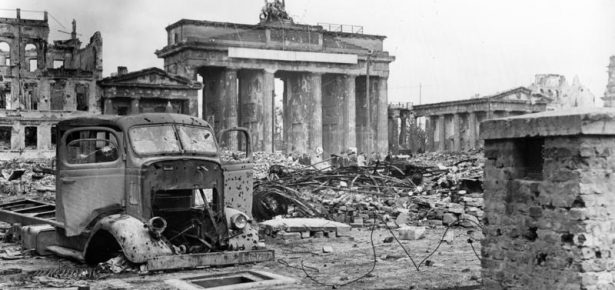
The current pandemic and global health and economic crisis has overshadowed an event that would normally have enjoyed a lot more discussion and attention: the 75th anniversary of the end of World War II in Europe on May 8, 2020. Yet, then as well as now it forced individuals and organizations to come to terms with catastrophe and think about starting anew after the collapse of many of traditional structures.
At the center of calls for cultural renewal in the Berlin of 1945 was the Cultural League for Democratic Renewal (Kulturbund), an organization made up of liberal and communist artists and intellectuals, whose leading representative was the expressionist poet Johannes R. Becher. The Kulturbund was licensed and supported by the Soviet occupation forces but it claimed the mantle of a non-partisan movement of “antifascist humanism” –the mission to restore the German traditions of tolerance, pluralism, and cosmopolitanism associated with Johann Wolfgang Goethe, Friedrich Schiller and other writers associated with Germany’s “classical Weimar” period.
The Kulturbund, like other initially pluralist non-partisan organizations in postwar Central and Eastern Europe, was soon brought into the Communist, Soviet-controlled orbit of the early German Democratic Republic, the communist East Germany. Tragically, the Kulturbund’s well-intentioned goals of “cleansing” German culture and reeducating a nation steeped in National Socialist indoctrination opened up necessary debates about the German past, but it could also play into the hands of new authoritarianisms. And against the background of the emerging Cold War, the communist regime in East Germany was only too eager to embrace the organization’s claim to “cultural renewal” for its own version of socialism. Ironically, the concept of a humanist “other Germany” that meant to heal the rifts caused by the Nazi trauma, ended up as a weapon in the Cold War confrontation of a newly divided country.
Yet, as I show in my book Antifascist Humanism and the Politics of Cultural Renewal, the idea of “cultural renewal” in Germany was not born in the rubble of World War II. The concepts of antifascist humanism combined the Communist International’s popular-front tactics of the 1930s with cultural nationalism, early-twentieth century reform ideas, and a rhetoric of protestant martyrdom. These eclectic ideas formed the glue that bound together antifascist cultural leagues in exile in Europe and Latin America, led by intellectuals such as Alexander Abusch and Anna Seghers. These intellectuals’ turn towards culture was not a retreat away from politics towards aesthetics, but a reflection of the early twentieth century’s intense politicization of culture.
Anniversaries of the end of the Second World War in Europe have historically been important milestones of national identity and democratic self-understanding. Germany’s president, Frank-Walter Steinmeier, in the most recent speech on the occasion of the anniversary, reaffirmed Germany’s commitment to Vergangenheitsbewältigung, the openness for discussions of its history as essential to the success of its democracy. Arguably, the early traces of this commitment can be seen in the demands of the German intellectuals to renew culture after the catastrophe of 1945. Unlike those intellectuals 75 years ago, we are still in the middle of multiple social, economical, and political upheavals. But similar to the situation at the end of World War II, the experience of crisis will likely lead to new visions and tropes of cultural renewal. Whether these movements will stay free of the contradictions and political manipulations of the twentieth century’s antifascist humanism will be for future historians to explore.
Latest Comments
Have your say!